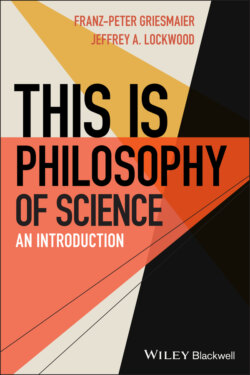Читать книгу This is Philosophy of Science - Franz-Peter Griesmaier - Страница 17
1.3 Knowledge and Truth
ОглавлениеScientific inquiry is often characterized as an especially promising way to increase our knowledge of the world by discovering more and more truths about it. But what exactly is knowledge, and what is truth? To answer the first question, we can start by determining what the difference between mere belief and knowledge is. Suppose Marvin strongly believes that atoms are held together with hooks. Does Marvin know this to be the case? It seems not, for the simple reason that it is false. We can’t know what’s false. Of course, we can believe what’s false, and we can falsely believe that we know something even though it is in fact false. But we can’t know that 2 + 3 = 78. Thus, we can conclude that in contrast to mere belief, a belief that counts as knowledge has to be true.
But being true is not enough for a belief to count as knowledge. Suppose I am terrified of snakes, flipping a coin every morning before entering the lab to see whether I have to use protective gear. This morning, the coin landed heads up, which means, to me, that there is a snake in the lab. Moreover, there in fact is a snake – unnoticed by me, a practical joker snuck it into the building. Do I know that there is a snake? It seems not. That the coin landed heads up doesn’t provide a good reason for believing that there is a snake. And yet it is true. This shows that for knowledge, we don’t just need truth – we need good reasons as well.
Putting it all together, knowledge amounts to true beliefs that are based on good epistemic reasons. Some of the readers might be aware of the fact that over the last several decades, it has become clear that even true beliefs for which I have good reasons might not automatically qualify as knowledge – something else is needed, at least in the kind of instances usually called Gettier cases.4 However, because we encounter such cases only rarely, if at all, during scientific research, we won’t discuss them here. In the next couple of chapters, we will instead explore the notion of evidence and how it is supposed to yield good reasons for our beliefs about the world, thus providing us with one ingredient of scientific knowledge.
The second ingredient is truth. There are many competing theories of what truth is, and there is an important debate in the philosophy of science whether or not our best theories are true. We can’t explore the first question here, but we will explore the debate about the alleged truth of scientific theories in Chapter 12. For now, we can just stipulate that by a true theory, or a true belief for that matter, we mean a theory (or a belief) that corresponds to the facts in the world. For example, the hypothesis that you are reading this sentence right now is true because it corresponds to the fact that you are reading it.
